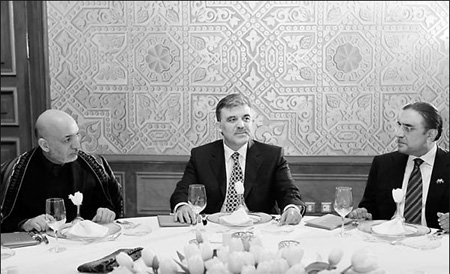Asia-Pacific
Regional approach sought on Kabul
By Qin Jize and Ai Yang (China Daily)
Updated: 2010-01-26 09:19
 |
Large Medium Small |
A high-level conference of Afghanistan's neighboring countries will be held in Istanbul on Tuesday, aimed at seeking a regional approach toward Afghanistan.
|
 Turkey's President Abdullah Gul (center), Afghanistan's President Hamid Karzai (left) and Pakistan's President Asif Ali Zardari attend a dinner in Istanbul on Sunday. The Turkey-Afghanistan-Pakistan Trio Summit Meeting was held in Istanbul Monday. [Agencies] |
Istanbul was also host to the fourth trilateral summit in Istanbul with the leaders of Afghanistan and Pakistan yesterday.
Afghani President Hamid Karzai and his Pakistani counterpart Asif Ali Zardari attended, along with government, military and intelligence officials.
"What we are trying to do is make sure the international community's efforts are translated to local activity and that the neighbors of Afghanistan are committed to its well being," Burak Ozugergin, the Turkish ministry of foreign affairs' spokesman, told a German Press Agency.
Today's regional meeting will be followed by a world summit in London later this week with the attendees including Yang, US Secretary of State Hillary Clinton and Karzai.
The London conference is likely to focus on security issues, tackling corruption and regional cooperation, reported AFP, citing an anonymous British government official.
Such measures could help to stabilize the country amid hopes that some districts could be handed over to Afghan control over the next 12 to 36 months.
Karzai told the BBC on Friday he would use the London talks to present a plan to offer money and jobs to Taliban fighters to lay down their weapons.
The world's attention has largely shifted from Iraq to Afghanistan, where, in a fresh illustration on Sunday of the country's fragility, elections planned for May were postponed to September.
Analysts believe that Foreign Minister Yang Jiechi's attendance at the two meetings does not signify much of a change on China's stance on the Afghan issue.
Li Qinggong, deputy secretary-general of the China Council for National Security Policy Studies, said the last thing on China's mind is to send troops into the war-torn country, instead, Beijing is seeking a middle ground on the issue.
"China is trying to be more engaged in non-security aspect, such as building hospitals and schools, providing technical training to military personnel and so on," Li said.
However, he noted that China should take more responsibility to help Afghanistan in the future.
"Once the US-led troops have retreated, China could take the lead to dispatch peacekeeping police to the area as part of the United Nations designated missions."
Ye Hailin, an expert on Asian studies at the Chinese Academy of Social Sciences, told China Daily that there is no best option on the current Afghan issue. "China will be a participant (in the conferences), but not the leader."
Afghanistan now poses the biggest threat in the area and regional security cannot be achieved before the Afghan issue is solved. However, Ye said that at present, no effort would drastically improve the current situation.











